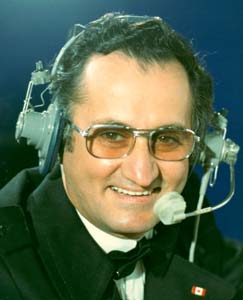
Year Born: 1925
Year Died: 2013
Year of Induction: 1997
Pioneer – Member of CAB Hall of Fame
Esaw, Johnny (1925-2013)
Johnny Esaw – Canada’s best-known ambassador of amateur sport – was born in North Battleford, Saskatchewan.
Johnny began his long and distinguished career in radio and television broadcasting when, in 1947, he became a sportscaster at CJNB, which was launched the same year in North Battleford.
Like many at a lot of early radio stations, Johnny was more than a sportscaster, he took on any job that was available, and even hauled fragile equipment for remote broadcasts. With some bulky equipment and a lot of pre-game preparation, Johnny focused on a play-by-play career in Regina. At CJNB, Johnny developed and honed his sports reporting skills, which went beyond reading off the wires, and created an interest in amateur sports that lasts to this day. From 1949 to 1956, he was a sportscaster with CKRM Regina, and then moved to Winnipeg when he accepted an offer to become Sports Director for CKRC replacing “Cactus” Jack Wells.
In 1960, Johnny made the transition from radio to television when he was appointed Sports Director of CFTO-TV, Toronto with a sudden introduction to management. As with his radio career, Johnny took on television broadcasts with the same studious approach. As the Sports Director, he worked closely with the CTV Television Network, soon becoming involved in the production of the CFL eastern teams’ football broadcasts, Grey Cup games in 1961 and 1962, and serving as kingpin in securing broadcasting rights for such outstanding attractions as CFL Football, Wide World of Sports, Sports Hotseat, International Hockey and Figure Skating, as well as CTV’s first Winter Olympics venture in 1964. The change from radio to television also introduced a different broadcast style that encouraged opinions in reporting sports, but Johnny continued to forge a special camaraderie with all of the athletes.
The continuing relationship with CTV eventually led to the creation in 1966 of the CTV Sports Department. Johnny continued his work as Sports Director at CFTO and liaised with the CTV Network until 1974 when he became Vice-President, CTV Sports. – a position he held until his retirement from the network on September 1, 1990.
Full retirement was not in the books. Within the month, Johnny signed a 5-year contract with the Houston Group as Vice-President, Broadcast Operations, and retained the position when Edelman World Wide, reputably the largest public relations firm in the world, bought the Houston Group.
Under the Edelman banner, Johnny was particularly involved in events such as motor racing, tennis, du Maurier golf, the Canadian Open, and the du Maurier International at Spruce Meadows in Calgary. At the same time, he was an on-camera spokesman for the Royal Bank at the Canadian Figure Skating Championships.
In 1996, Johnny really did retire to reflect on a truly unique and colourful half-century career involving virtually every Canadian sports activity.
Just some of those achievements:
- Taking figure skating off the society pages and moving it to the forefront through 35 years of prime-time television programming across Canada and around the world;
- Negotiating the Innsbruck Olympic Winter Games TV rights for CTV (1964); and his continuing involvement with all succeeding Winter Games, culminating in world coverage from Calgary in 1988 as host broadcaster and capping this, his greatest negotiation victory, by acquiring the rights to the Official Film of the XV Winter Games in Calgary – an event acclaimed as the best Olympic coverage of all-time;
- Producing in Vienna in 1967 the first colour television of a hockey game;
- Covering in Europe the World Amateur Hockey Championships and creating an awareness and interest among Canadians of the quality of Soviet players – leading to the famous Canada-Soviet series in 1972; Handling the first broadcast of the World Curling Championships – the Scotch Cup; Serving as Chairman for 21 years of the Air Canada Amateur Sports Awards; Acquiring all sports television rights at Expo ’67 in Montreal; Reducing, in concert with a selected Board of successful Canadian businessmen, the government’s 80% share of dollars allocated to amateur sport and increasing the private sector contribution to 45%.
- Chairing the $3.2 million fund-raising campaign to build the Toronto Rehabilitation Centre for Cardiac Care, and the organizing of the telethon that brought in millions of dollars for cancer research in honour of Terry Fox.
For his dedication to amateur sport and humanitarian work, Johnny Esaw earned many honours – among them:
- 1974 Foster Hewitt Award for Excellence in Sports Broadcasting in Canada
- 1976 Olympic Medal from President of Austria – contribution to Winter Olympics
- 1977 Sports Federation of Canada Award – TV Broadcaster-of-the-Year
- 1978 Ontario Gov’t Achievement Award for Contributions to Amateur Sports
- 1984 Inducted into Canadian Football Reporters’ Hall of Fame
- 1985 Doug Gilbert Award for Sportscaster-of-the-Year in Canada
- 1988 Gemini Award for Outstanding Figure Skating Coverage, Calgary Games
- 1988 Inducted into the Canadian Winter Olympics Hall of Fame
- 1990 “Johnny Esaw Bursary” – established by the Canadian Figure Skating Assoc.
- 1991 Inducted into the Canadian Amateur Sports Hall of Fame
- 1992 Inducted into the North Battleford, Saskatchewan Sports Hall of Fame
- 1992 Made a Life Member of the Canadian Olympic Association
- 1997 Presented with the Sports Media Canada Achievement Award
- 1997 Inducted into the Canadian Association of Broadcasters’ Half-Century Club
- 1997 Johnny Esaw was inducted into the CAB Broadcast Hall of Fame.
- 2004 Appointed a Member of the Order of Canada.
- Johnny Esaw died on April 6th 2013.
Written by Pip Wedge – October, 1997
